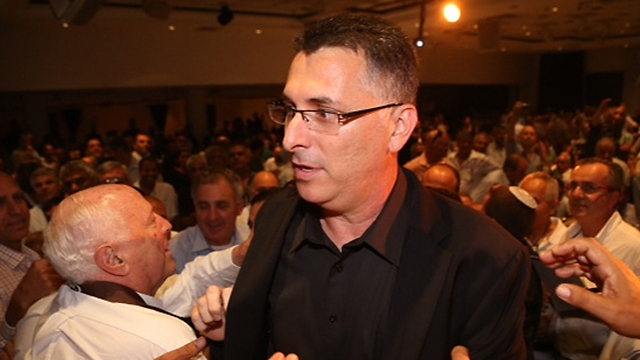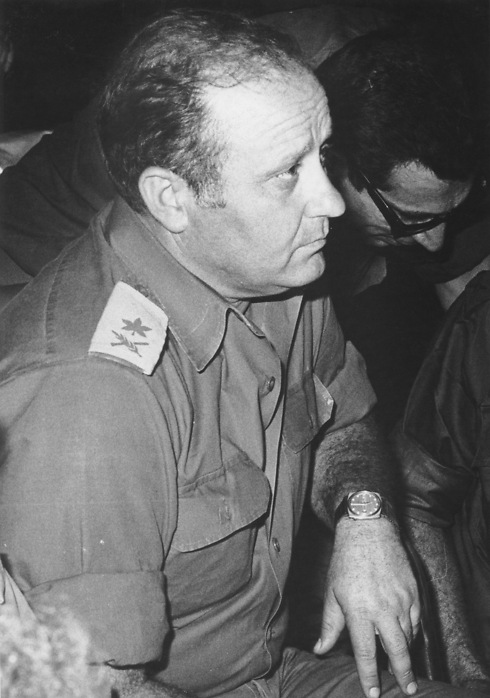
Building settlements while Israel burns
Op-ed: Biggest challenges Israel faces today lie in Gaza-border area, Golan Heights, and in Jerusalem, where a third intifada has begun unnoticed. But Likud ministers are only interested in settlements.
On Wednesday, when Gideon Sa'ar quit politics, I, in despair, quit writing. Some 40 minutes later, I was back at the keyboard. Everything in life is ephemeral, particularly when it comes to political decisions.
Sa'ar, at 48, is a year older than Benjamin Netanyahu was when he first became prime minister – young enough to walk away and return. Time is of the essence; it facilitates a flexibility of sorts. In both men there is an element of the party of old. They share certain values, a common hatred, nostalgic remnants for collectors.

In the background on the television, someone spoke of a political bombshell. Bombshells, as you know, have a tendency to cause collateral damage, to yield casualties. I'm skeptical about the damage in this instance; not because of Sa'ar, but because the Likud in recent years has turned into a disjointed party – from my perspective at least. That's where Netanyahu's challenge lies, not in the departure but in the secretion.
Here's an example: Two weeks ago, a new neighborhood was dedicated in Har Bracha. Likud representatives at the ceremony included Yisrael Katz, Tzipi Hotovely, Yuli Edelstein and Yariv Levin – all of whom hold office in the party.
I don't have a problem with new neighborhoods in Samaria, and nor with festive ceremonies. I do, however, struggle with the number of politicians who choose to go there of all places to cut ribbons and reap rewards. When was the last time that four senior Likud members went to a ceremony for a new neighborhood in the south of Israel? When was the last time they visited one of the communities in the Galilee?
Menachem Begin's Likud supported the settlements, but it wasn't the settlements' party. There's a significant difference.
Israel's territory covers some 21,000 square kilometers beyond the region of Judea and Samaria. The Likud Knesset members, however, spread themselves out primarily there.
The biggest challenges facing the State of Israel today lie in the Gaza-border area, the Golan Heights, and in Jerusalem, where a third intifada has begun unnoticed. If the Likud members are looking for places where citizens are crying out for public relations, the list is a long one. They can approach me. Despite all my appreciation for the settlement enterprise, it cannot be the sole focus of a ruling party. That's what sectorial parties are for.
Here's another example from the past week that is worth keeping in mind, if only for the shame of it – the funeral of Yitzhak (Haka) Hofi. Check to see which of the Likud members bothered to show up to pay their last respects to the man who served as GOC Northern Command during the Yom Kippur War and later as head of the Mossad.

The answer is not a single one. Hofi is a chunk of history: He saved the Golan Heights, worked under Begin, and here we have a generation who never knew Menachem. No splendor and no glory; only shame. The system in the Likud is based on party members. Hofi is no longer a potential party member; Har Bracha, on the other hand, has many.
And it's not only the public appearances of the Knesset members, but the party's vision too that no one seems to be able to explain. Moshe Kahlon bemoans the loss of the Likud's social agendas, Dan Meridor complains of the party's radicalization, and everyone has gripes about Netanyahu. Sa'ar's retirement leaves the Likud with the same problems, the same question marks, but with one less Knesset member.
One thing is for sure: The list of Likud breakaways is more impressive than the presiding list – Benny Begin, Meridor, Kahlon, Michael Eitan and now Sa'ar. And they may soon be joined by Gilad Erdan. Days of awe: Who by primaries and who by the sword, who by dispute and who by fire.
If they start a new party, it'll look like the Likud of old – only without a Netanyahu of a different nature. The prime minister today remains practically alone at the top, a man facing his destiny, a man facing his party. It's of no good to him, and of no good to us. Netanyahu is a well-oiled machine of government. Alongside the shortcomings that everyone loves to point out, he has some big pluses too. It's high time he also oiled the parts that relate to personal relations.
Everything's within reach
The circuits here are short. The distance between Gaza and Jerusalem is only an hour and a half by car; between Lebanon and Tel Aviv, three hours without traffic.
The distance between a cabinet minister and an Israel Defense Forces brigade commander is one common friend; and between a senior minister and a news anchor, there's sometimes no distance at all.
Everything's within reach, nearby – a small country with big complexes. During times of war, there are three things that help cabinet ministers make decisions – relevant information, party politics and personal scores. The order of importance changes from war to war and from one minister to another.
The spat that ensued this past week between ministers Naftali Bennett and Moshe (Bogie) Ya'alon was over the information and the politics behind it. Bennett wanted information straight from the front, without any filters – do-it-yourself operational plans of sorts. The cabinet provided him with red tape and endless briefings.
The cabinet discussions are lengthy, exhausting and, in many instances, purposeless. Everyone wants to have their say and go on record for all time.
From the outside, it looks and sounds serious; but it's hard to make serious decisions after seven hours of discussions. If anyone wants to know what's happening in the field, they can simply pick up the phone themselves. A senior minister will invariably find someone happy to provide answers on the other end of the line.
It's not exactly by the book, but it is logical. He can go out into the field too. The clouds of dust blown up by the heavy-duty vehicles look good on camera, create a sense of warfare, even if they don’t necessarily offer any information. There were ministers in the past who took up residence along the front line to feel connected and to serve as personal examples. Today, when the guns go off along the front, traffic jams appear on the way to the Neve Ilan television studios.
Bennett did a bit of this and a bit of that; he got a taste of it all. Commanders spoke to him. The thought that a cabinet minister is excluded from certain tactical steps never entered their heads.
During the Second Lebanon War, when Bennett served as a commander of company of reservists, he initiated a meeting with then-minister Avi Dichter to discuss the fighting, and then later supported the protest against the government. For better or for worse, the so-called Shakshuka System, the connection between private capital and government, is a part of his nature.
Bennett didn't need Rabbi Avichai Ronsky, the former chief rabbi of the Israel Defense Forces, to learn about the threat of the tunnels. He had all he needed.
I met Ronsky in Gaza in January 2009. I was on reserve duty, and he as the army's chief rabbi asked to speak to us for half an hour. During his address, some of the people drifted away. Reservists can be very direct even when faced with a brigadier general. I remained – not because of the content, but because he is a positive man, a warm man, devoid of political cynicism.
When Operation Cast Lead was over, he was accused of preaching about religious affairs. Soldiers were afflicted with visions and reported having seen the matriarch, Rachel. The accusers attributed magical powers to Ronsky. But he didn't cause the Israel Defense Forces to find religion, and he isn't responsible either for the number of religious commanders. Sometimes a rabbi is merely a rabbi.
Bennett's urging to act against the tunnels is part of what shaped the war. Bennett is not the first one to have identified the threat, and Bogie is not the first to have delayed the decision. In Israeli politics, those who are the first to identify are also the first ones to break away. It's unhealthy. Modestly keeps you connected.
While Bogie and Bennett were arguing about the tunnels, Israel failed the first-rocket test. Contrary to promises, nothing changed. Hamas offered explanations. Israel didn't respond. And now we must wait for the first one to notice that the first rains came early this year.











